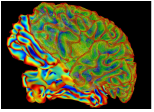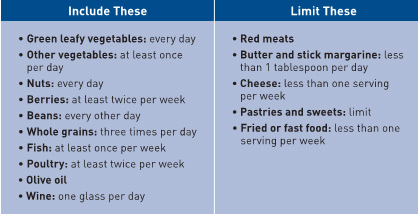Are you ever a little concerned for yourself or your loved ones in regards to Alzheimer's disease? or just general cognitive decline over the lifespan? I'm here to tell you it doesn't have to be an inevitable fact of aging. There are specific actions you can embark on to protect your brain. Research is showing a diet similar to the mediterranean diet, titled the MIND diet (Mediterranean-DASH Intervention for Neurodegenerative Delay) can help you accomplish just that.
Here are the general guidelines for foods to include or avoid in the MIND diet:
Here are the general guidelines for foods to include or avoid in the MIND diet:

It tends to be true that what benefits the heart, benefits our brains since they work off the same principles, a steady flow of oxygenated blood and specific nutrient requirements for optimal functioning. Since my expertise is in neuro-nutrition I would go a step further with this diet and add a few more principles to it:
1. Exercise, move, get going...the more blood flow to our brains the better you will think and feel.
2. Purchase organics when you are able to, many studies are showing correlation with pesticide residues in human bodies being linked with neuro decline over the age span. DDT, glyphosphates, and many others are showing a linkage.
3. Maintain steady blood sugar. Eating with whole foods in mind at each meal with carbohydrates, protein, and healthy fats combinations. Diabetics are at a three-fold risk of cognitive impairment later in life and Alzheimer's has been called "type 3 diabetes" by several functional medicine practioner's as it seems failing neurons no longer respond appropriately to glucose, the brains main source of fuel.
Have questions, I'd love to hear from you. Please feel free to post a comment or e-mail.
1.Martha Clare Morris, Christy C. Tangney, Yamin Wang, Frank M. Sacks, David A. Bennett, Neelum T. Aggarwal. MIND diet associated with reduced incidence of Alzheimer's disease. Alzheimer's & Dementia, 2015; DOI: 10.1016/j.jalz.2014.11.009
2. http://www.scientificamerican.com/article/studies-link-ddt-other-environmental-toxins-to-late-onset-alzheimers-disease/
3. Messier C, Tsiakas M, Gagnon M, Desrochers A, Awad N. Effect of age and glucoregulation on cognitive performance. Neurobiol Aging 2003;24: 985-1003.
4. Barbieri M, Rizzo MR, Manzella D, et al. Glucose regulation and oxidative stress in healthy centenarians. Exp Gerontol 2003;38:137-43.
1. Exercise, move, get going...the more blood flow to our brains the better you will think and feel.
2. Purchase organics when you are able to, many studies are showing correlation with pesticide residues in human bodies being linked with neuro decline over the age span. DDT, glyphosphates, and many others are showing a linkage.
3. Maintain steady blood sugar. Eating with whole foods in mind at each meal with carbohydrates, protein, and healthy fats combinations. Diabetics are at a three-fold risk of cognitive impairment later in life and Alzheimer's has been called "type 3 diabetes" by several functional medicine practioner's as it seems failing neurons no longer respond appropriately to glucose, the brains main source of fuel.
Have questions, I'd love to hear from you. Please feel free to post a comment or e-mail.
1.Martha Clare Morris, Christy C. Tangney, Yamin Wang, Frank M. Sacks, David A. Bennett, Neelum T. Aggarwal. MIND diet associated with reduced incidence of Alzheimer's disease. Alzheimer's & Dementia, 2015; DOI: 10.1016/j.jalz.2014.11.009
2. http://www.scientificamerican.com/article/studies-link-ddt-other-environmental-toxins-to-late-onset-alzheimers-disease/
3. Messier C, Tsiakas M, Gagnon M, Desrochers A, Awad N. Effect of age and glucoregulation on cognitive performance. Neurobiol Aging 2003;24: 985-1003.
4. Barbieri M, Rizzo MR, Manzella D, et al. Glucose regulation and oxidative stress in healthy centenarians. Exp Gerontol 2003;38:137-43.


 RSS Feed
RSS Feed

